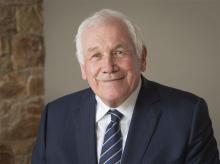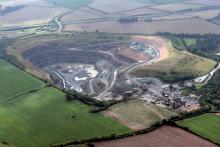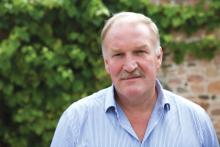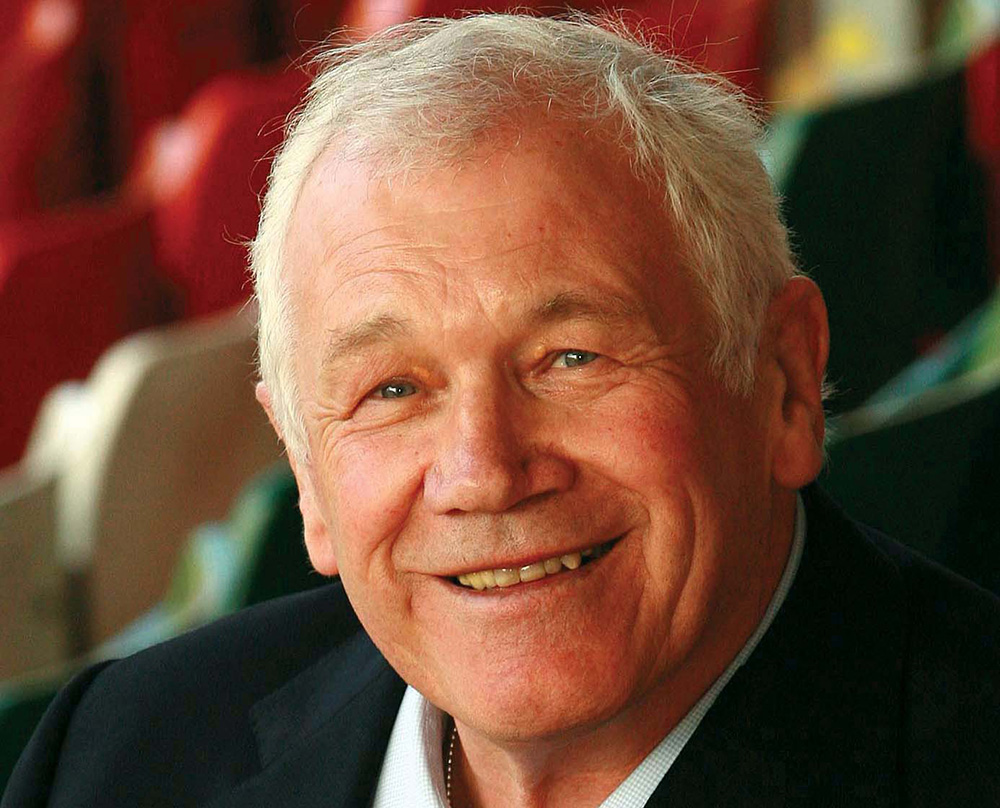
Whether launching into crunching tackles on opposition players in his rugby heyday as Leicester Tigers’ lock in the 1960s to founding and building up Breedon and Aggregate Industries into UK building materials sector heavyweights, Peter Tom’s passion and enthusiasm have been evident.
Given such lust for life, it should have been no surprise to anyone when news broke that at the age of 81, Tom had teamed up with long-time business associate and close friend David Williams to launch Bay Capital on the London Stock Exchange on 30 September 2021.
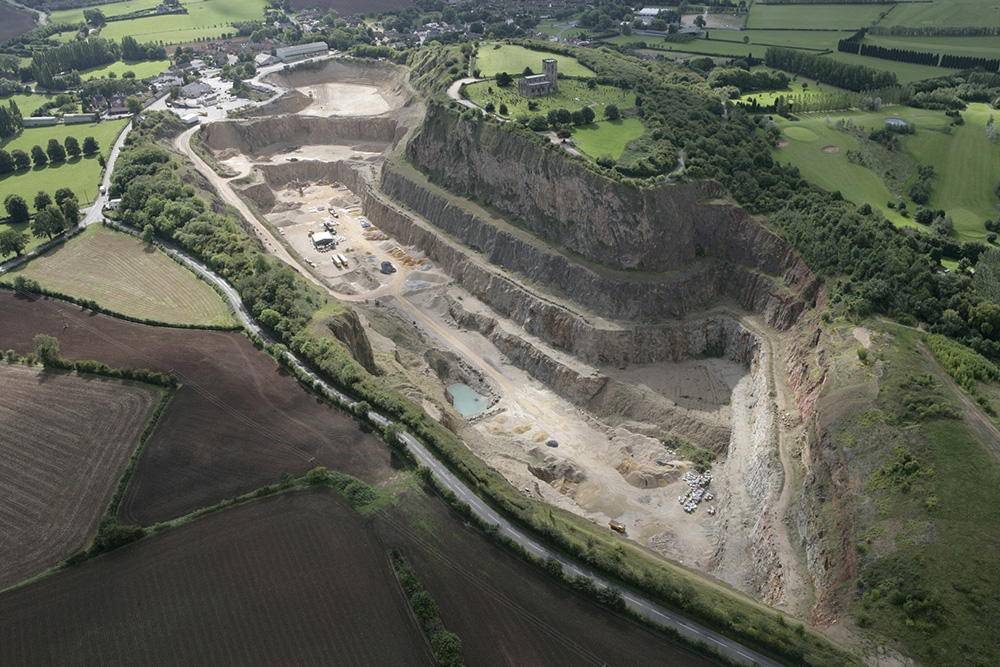
The new investment firm has raised £7 million to fund initial operations. It will look to acquire or invest in industrial, construction and business services companies and the software and technology companies that service them.
“The COVID-19 pandemic has created business opportunities that we will look to take advantage of,” says Tom, Leicester Tigers executive chairman and a proud CBE recipient for his outstanding contribution to British commerce and sport. “What we have been saying, though, since the successful launch of Bay Capital is that when we [with Simon Vivian, ex-Breedon] started Marwyn Materials around 12 years ago, it did take nearly two years before we did the reverse takeover of Breedon. My experience is that deals take much longer than you might expect, so don’t necessarily expect to see anything being announced by us soon.”
Tom retired as executive chairman of Breedon 2019 after playing a key part in turning the Breedon on the Hill, Leicestershire, England-headquartered firm from a shell company into a British market leader after Breedon’s £336 million purchase of Hope Construction Materials in 2016. He had previously founded Aggregate Industries by merging Bardon and Camas in 1997 before later selling it to Swiss sector heavyweight Holcim for £1.8 billion.
The Cornwall-born, Guernsey-based octogenarian was chairman of Aggregate Industries when he first retired in 2007, only to return to the industry to mastermind Breedon’s rise.
I ask Tom to describe what David Williams, formerly of Marwyn Materials, another key player in the Breedon success story, brings to the new Bay Capital venture.
“I’ve known David for 34 years. He was chairman of a major waste company and Bolton Wanderers FC. The club was one of the first to build a modern out-of-city or large town football ground, the Reebok Stadium. He invited me there as executive chairman of Leicester Tigers, as he wanted to get more details about similar works we were doing at our club.
“When he set up Marwyn Materials, we resumed our business relationship and friendship. He brings a balanced view to business and sometimes takes my great enthusiasm and nails my feet to the floor as we work out how we’re going to approach things. We went through a lot together with Breedon, and he understands that it takes time to do deals.”
Tom says he and Williams are keen to make sure that the rolling costs of Bay Capital are “not too much” as they build up the new venture. “We do have potential building materials industry colleagues that may be keen to join us. The great thing about our industry, whether it’s Tarmac, Hanson, Cemex, or another company, is that the people who have worked in it for some time all know each other.
“There are a few ex-industry people who have set up their own consultancies. We may make use of them when we have a potential acquisition. It’s some time since I worked in the US aggregates industry, but I’ve also kept in touch with former colleagues there. They could also be useful contacts.”
Tom’s father bought a share in Bardon Hill in the late 1940s, and the family moved to Leicestershire from Cornwall in the 1950s. Tom spent a lot of his youth in the quarry and was even crushed in an accident there when he was 10. But that didn’t put him off the business.
He says he used to joke with Breedon and Aggregate Industries’ university graduates and other young people early in their careers that they “better get out of the building materials industry after two years, or you’ll never get out”.
“Way over 30% of industry employees have done more than 30 years’ service for the businesses they’re in. I like the fact that the men, and increasingly women, who work in our industry are people you ask rather than tell to do things. The guy working in a quarry for 30 years knows every idiosyncrasy of the site: go into this corner to gain more material, don’t do this and that. They tend to be cruel with their humour, which means you get rightfully cut down to size if you get ahead of yourself. You meet amazing characters in this industry.
“One of the special things is you’ll be working in a major quarry, and you’ll have a big project that you’re supplying material to. Twenty years later, you’ll be boring your kids or your grandkids about how you supplied material for HS2 or that big Amazon warehouse you pass all the time driving on a motorway.”
I am keen to learn Tom’s thoughts on whether the COVID-19 pandemic has had any lasting impact on the UK construction materials industry.
“I was in Leicester at Tigers all day the other day [early October 2021]. We started building a 200-bed hotel at the club on 23 April 2020, and it’s externally finished. We’re going to open it in spring 2022, and you find yourself thinking for a minute, ‘How on earth did this get built?’ given we’ve had the pandemic. But the construction and many other industries have carried on, with notable exceptions like hospitality having been worse hit.

“From a Leicester Tigers perspective, the crowds are back at Welford Road, and our season ticket sales have recovered.
“COVID certainly changed lots. You could ask, ‘Would I have launched Bay Capital if COVID hadn’t hit?’ I think I would. I’ve always been quite lucky in that I get up early and find business itself fascinating. I’ve also got various business ventures here in Guernsey. David and I were chatting about this new venture as far back as a year ago and working out when there would be a degree of normality to move things forward.”
Tom says Bay Capital is focusing on British building materials market acquisitions, with no plans to follow other young buy-and-build groups like London-headquartered SigmaRoc.
“SigmaRoc has done very well. I know its chairman, David Barrett, and we worked together at London Concrete. I think around the industry edges there’s always opportunity. We want to avoid getting into bidding wars. One of the reasons people were happy to engage with us at Breedon is that we were always very confidential. There were lots of potential deals that didn’t happen for many reasons that people never knew about. If you’re the chief executive of a major, and we were engaging in a potential deal, you could trust us that the details would remain confidential. It would be the same if we’re dealing with a family-run construction materials business. One of the reasons for creating the [Bay Capital] funding vehicle was to show a major corporation or a family business how we could fund a deal and fund it quickly. It gives great reassurance to people that we have the financial firepower.”
Commenting on how the circular economy and greener production is changing the modern building materials industry, Tom says: “It is so important. At Bardon Hill Quarries, we were the first or second to buy a Standard Havens asphalt plant that recycled. We were very active in recycling again at Aggregate Industries and Breedon. If you went into a major quarry 20 years ago, there would be conveyor belts running empty and lots of lights on all day. All of that is changing thanks to, for example, software that ensures that conveyor belts are only working if there’s material passing along them. The modern equipment you buy is also much more sustainability-focused and sensitive to the environment.”

The UK government’s ‘Levelling Up’ agenda, improving the Midlands and Northern England’s infrastructure to mirror London and the South East’s, is creating huge commercial opportunities for building material suppliers. A key infrastructure megaproject is HS2 (High Speed 2), establishing a national high-speed railway linking London, Birmingham, Leeds, and Manchester, with connectivity to the existing rail network. It is hoped that HS2 will not only improve people’s mobility but also create more freight transport opportunities, relieving some of the often-heavy traffic congestion on England’s major roads network.
“If you want to modernise the infrastructure of a country, you must consider how you are going to get your aggregates, cement, and other materials to your work sites, along with how best to reduce your carbon footprint.
“Many years ago, my companies were heavily involved in putting rail freight terminals in London. By the time I left Aggregate Industries, the company was transporting a lot of materials into London terminals for asphalt and ready-mixed concrete customer applications. Breedon Hope has a lovely facility in Dagenham, Essex, where they bring the cement in. The difficult bit when it comes to rail freight is creating network flexibility, so you can equally meet the material transport needs of quarries in, say, Newcastle as well as in London.
“There is now a lot of software coming out that allows you to monitor and control your delivery trucks. We all use Zoom and Microsoft Teams. Quarry companies need to invest the capital in modern and efficient equipment.”
Tom feels the coronavirus pandemic has made the entire business world far more efficient. “It’s been fascinating going through various things at Leicester Tigers. We realised that there was a lot of work that we were doing inefficiently before the pandemic. We’ve changed the whole way we do our mail order and club shop and changed our systems, so we need fewer people. A lot of other companies will be doing the same.”
The “inflation proof” nature of the UK building materials industry is, Tom believes, another key factor in Bay Capital’s business growth strategy. “You see a lot in the news about potential inflation, and if you’re an investor, you might be favouring investment in SigmaRoc, Breedon, CRH or another aggregates business. Some statistics around three to four years ago showed that aggregates prices since the Second World War averaged around 2% above inflation.
“This is as good a time as the industry can expect. You look at housebuilding, and you tend at times to forget how much of a benefit to the aggregates supply business it is. It’s a very busy industry now, and it looks like being very busy for the foreseeable future. A lot of warehouses are also being built all over the country.”
The Aggregates Levy – £2 per tonne of material produced – continues to be a controversial tax within the UK aggregates supply industry, with many industry figures questioning the need for a tax purportedly going towards various green infrastructure projects when the industry has an impressive track record of reducing its environmental impact by, for example, improving quarry site biodiversity, restoring former quarry sites to nature, and using dust- and noise-suppression solutions on production plant.
Furthermore, from April 2022, red diesel will be available only to the UK agriculture and rail sectors. As a result, users of off-highway construction machinery will have to pay an extra 46.81p per litre for their diesel, paying the standard tax rate of 57.95p per litre rather than the subsidised red diesel rate of 11.14p per litre. Quarry operators say this will notably increase their site operating costs.
I’m keen to learn Tom’s take on those two big aggregates industry talking points. “About 30% of all UK aggregates are now recycled. What percentage of that was due to the Aggregates Levy, I don’t know. What was collected was always meant to be used in infrastructure expenditure, but I don’t think that’s happened. To a degree, in my latter period at Aggregate Industries and in my time at Breedon, it has ended up as a cost to the consumer [due to higher product pricing].
“I think the Aggregates Levy was introduced with good intention, but I’m not sure the industry is more efficient. It’s the same with the red diesel change. Ultimately, the customer ends up paying for it. In many instances, that’s the government paying, when it comes to their funding of major infrastructure projects.”
In my research before talking to Tom, I read a lot about the various milestones reached in his executive career with Aggregate Industries and Breedon. But what satisfied him the most in his time at the British sector giants?
“At Aggregate Industries and Breedon, we ensured that our colleagues had shares in the business. Seeing some of your colleagues benefit significantly from that was very pleasing. I remember at Aggregate Industries getting ultimate planning approval after buying the Old Rise Rocks land some 40 years ago. It is pretty much where the new Bardon Hill Quarry is.
“I remember sitting in the Breedon boardroom with Simon Vivian in September after we’d just bought the company, drinking coffee and me saying to Simon, ‘I hope you and I are as clever as we think we are!’ Seriously, though, I think achieving success a second time proved that it wasn’t down to luck.”
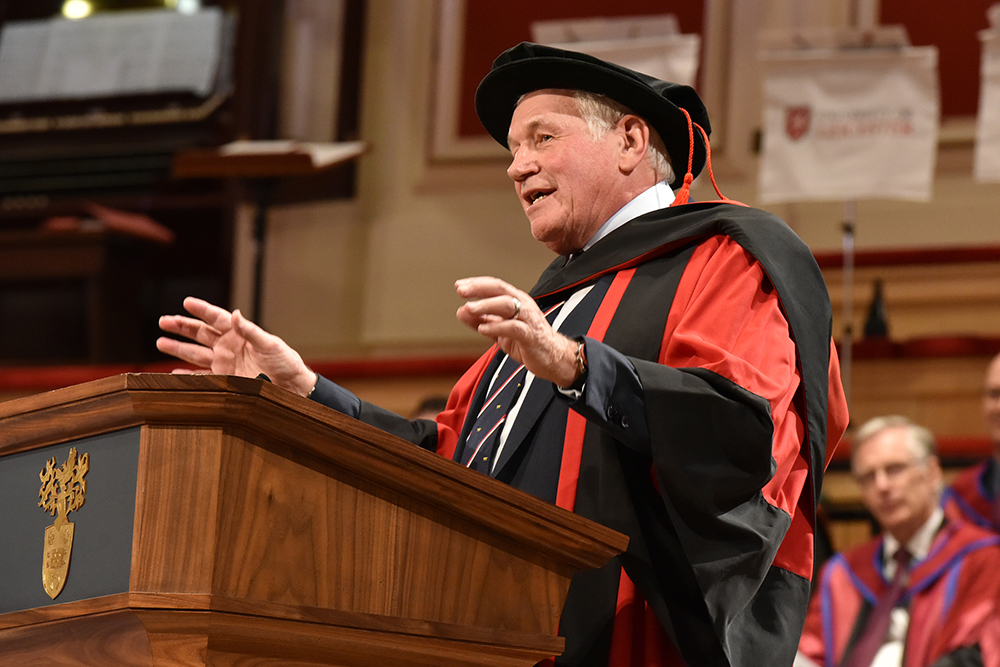
Tom says he has always loved putting capital into his businesses to improve their day-to-day operations.
“I remember early one morning going to a quarry site of one of the businesses that we bought and having a look at the crusher shed. I explained to a guy onsite who I was, and he said, ‘I’ve never met a boss before’. It is one of those funny moments that you remember, and I have been so fortunate to work in an amazing industry full of incredible people.”
Tom says he is delighted with the continued success of Aggregate Industries and Breedon. “They are two super businesses. Breedon, in particular, is going great guns. If you read management books, the biggest trick of all is making succession work. And I’m pleased to see the new quarry at Bardon Hill and some of my former colleagues have been promoted and are doing well.
“When I left Breedon, the share price was around 70p, and it’s now trading around the £1 mark. I’ve gone, as have Simon Vivian, Tim Hall and Pat Ward. Rob [Wood, CEO] and the team are doing a great job. It’s a very competitive industry, but I’m proud that I worked across the business. I want Tarmac, Hanson and all other industry firms to do well.”
I joke with Tom that at an age when most successful business executives would be enjoying their golf club memberships and world travel to the full in retirement, he is putting his admirable energy into establishing a third UK building materials conglomerate. So, why do it?
“I like business. I like people, and I like solving problems. I’ve got a restaurant here in Guernsey that we’ve had for 11 years, and we don’t try and be clever, and run it in a way that works. It’s successful, as is my boat works business. It’s actually three businesses we have here, as we also buy the fuel for the boats and repair and look after them.
“I do get annoyed with myself as I sit in places observing how things are done and working out how I’d do it differently. Numbers also make a lot of sense to me.
“I’ve got two lovely grown-up daughters and four grandchildren, and I was fortunate enough to get married later in life and have another son and daughter.”
Given the wealth of commercial opportunities set to come the way of the well-financed Bay Capital investment company, there is little chance the children will find their father at home on the sofa any time soon.

